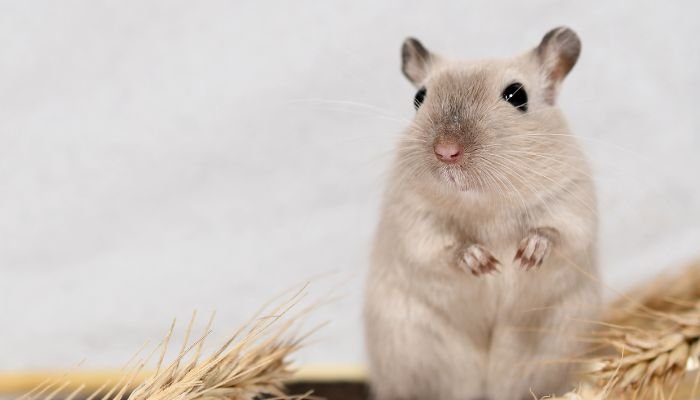
In this article, we’ll dive into the health, lifespan, and care of dove gerbils. We want to make sure you have all the information you need, so you’re not just ready for cuddles but also for the responsibilities that come with pet ownership. With a little love and knowledge, you can ensure your furry friend lives a happy, healthy life.
Understanding Dove Gerbils
Dove gerbils are a color variant of the Mongolian gerbil, which is one of the most popular pet rodents. They got their name from their beautiful, dove-gray fur, which makes them a charming addition to any home. These little guys are social creatures that enjoy the company of their human caretakers and other gerbils.
If you’re thinking about getting a dove gerbil, keep in mind that they’re active and playful. They love to dig, run, and explore, so their habitat needs to be enriched with tunnels and toys. As with any pet, understanding their nature is key to ensuring they thrive in your care.
Average Lifespan
When it comes to dove gerbils, you can generally expect them to live between 2 to 4 years, though some might live even longer with great care. That’s a relatively short lifespan compared to dogs or cats, which means you’ll want to make every moment count.
Several factors influence a dove gerbil’s lifespan, including genetics, diet, and living conditions. A healthy gerbil that gets the right attention and care can live successfully into that 4-year mark. In contrast, poor living conditions or inadequate diet can lead to a shortened lifespan. Remember, it’s not just about the number of years; it’s about the quality of those years!
Common Health Issues in Dove Gerbils
Dove gerbils are generally robust, but like any pet, they can face health issues. One common problem is wet tail, which is a condition often caused by stress or dietary changes. If you notice unusual diarrhea in your gerbil, it’s essential to consult a vet quickly, as this can lead to serious complications.
Another issue is skin problems, which can arise from poor hygiene or mites. Keeping their cage clean and checking for signs of discomfort can help prevent these issues. Regular vet check-ups are also a good idea to catch anything early—think of it like a health insurance policy for your pet.
Signs of Illness
You might be wondering how to spot when your dove gerbil isn’t feeling well. Look out for these signs:
- Loss of appetite
- Sudden lethargy
- Unusual vocalizations
- Changes in fur texture (like bald spots)
If you see any of these signs, don’t hesitate to talk to a vet. Early detection can make a big difference in treatment.
Nutrition and Diet
A proper diet is crucial for the health of your dove gerbil. They need a balanced mix of high-quality pellets, fresh fruits, and veggies. Think of their diet as a buffet—they’re not picky, but they do best with a variety.
A well-rounded diet should include:
- High-quality gerbil pellets
- Small amounts of fresh veggies (like carrots or bell peppers)
- Occasional treats like seeds or dried fruits
- Unlimited access to fresh water
Avoid feeding them sugary or fatty foods, as these can lead to obesity and other health problems. Just like us, what they eat plays a big role in how they feel and how long they live.
Creating a Healthy Environment
The living conditions you provide for your dove gerbil can have a massive impact on their health and happiness. A spacious cage with plenty of room for them to burrow, explore, and play is essential. The substrate should be something like aspen shavings or paper-based bedding—avoid cedar or pine, as these can be harmful to their lungs.
Make sure to include:
- Hideouts for security
- Exercise wheels for activity
- Tunnels to satisfy their digging instincts
- Regular cleaning to prevent infections
Creating a stimulating environment helps keep your gerbil happy and engaged, which is key to their overall health.
Social Needs and Mental Stimulation
Dove gerbils are naturally social and thrive on interaction, whether it’s with other gerbils or you! They enjoy playing and exploring, so be sure to spend time with them each day. They can often live happily in pairs or small groups, as long as they’re introduced properly.
Think of your dove gerbil like a little friend who craves company. If you’re away a lot, consider adopting a pair, so they can keep each other entertained. Providing toys, tunnels, and time out of their cage will help keep their little minds sharp and their spirits high.
Regular Health Check-ups
Just like any other family member, your dove gerbil needs regular health check-ups. Finding a good vet who understands small animals is crucial. Annual check-ups can catch potential issues early, keeping your little buddy happy and healthy.
During these visits, the vet will typically check for signs of common health issues, assess weight, and provide you with guidance on diet and care. It’s a great time to ask questions or discuss concerns—don’t be shy!
Bringing a dove gerbil into your home can be a joyful experience, but they also require responsibility and care. Understanding their lifespan, health needs, and the environment they thrive in is key to a happy pet. With the right nutrition, a clean habitat, and plenty of social interaction, your dove gerbil can enjoy those 2 to 4 years to the fullest.
So, whether you’re a first-time gerbil owner or a seasoned pet parent, remember that your dove gerbil relies on you for a happy, healthy life. Embrace this journey together, and you’ll create a bond that will enrich both your lives.
